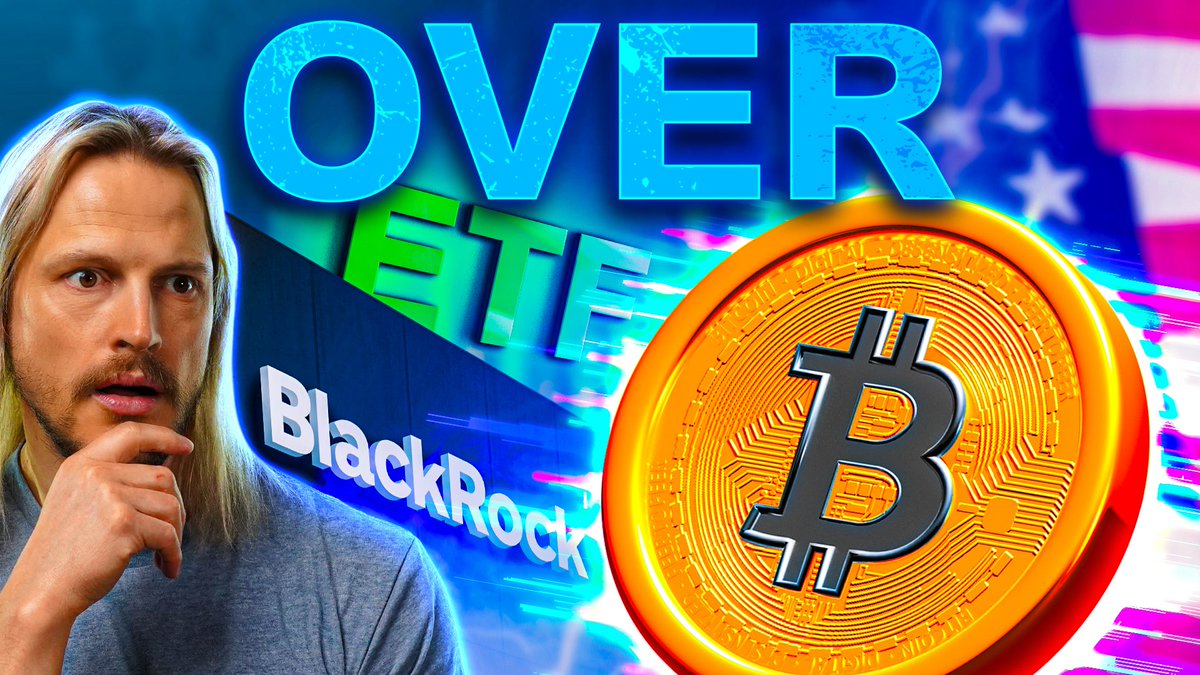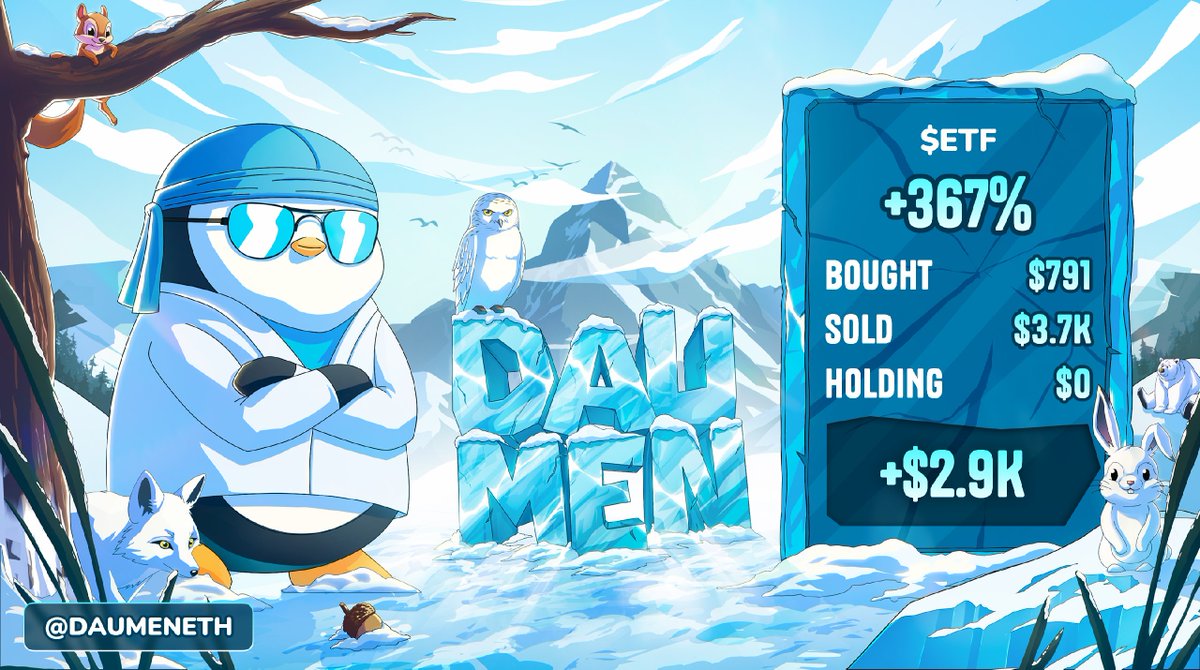This token isn’t available on the OKX Exchange. You can trade it on OKX DEX instead.

etf
sol etf coin price

5PKXV8...7LFo
$0.00013748
+$0.000099406
(+261.09%)
Price change for the last 24 hours

How are you feeling about etf today?
Share your sentiments here by giving a thumbs up if you’re feeling bullish about the coin or a thumbs down if you’re feeling bearish.
Vote to view results
etf market info
Market cap
Market cap is calculated by multiplying the circulating supply of a coin with its latest price.
Market cap = Circulating supply × Last price
Market cap = Circulating supply × Last price
Network
Underlying blockchain that supports secure, decentralized transactions.
Circulating supply
Total amount of a coin that is publicly available on the market.
Liquidity
Liquidity is the ease of buying/selling a coin on DEX. The higher the liquidity, the easier it is to complete a transaction.
Market cap
$137.48K
Network
Solana
Circulating supply
999,999,960 etf
Token holders
171
Liquidity
$161.21K
1h volume
$7.44M
4h volume
$7.44M
24h volume
$7.44M
sol etf coin Feed
The following content is sourced from .

memewizd
$ETF
AL699xjgGPGubMpBQhWsmQEGmzrVas9za7b9oUaE6gfG
150k now
dyor - Electric Turkey Fryer ⚡️🦃🍗
An American holiday cheat code.
Drop a whole turkey in hot oil.
15 minutes later — crispy, juicy perfection.
Now imagine that’s Solana’s ETF.
Throw $SOL into the market fryer.
15 mins later: golden, crispy ATH. @aeyakovenko
Show original
2.22K
9

TechFlow
Written by Zhang Wuji Wepoets
With the rapid development of blockchain technology and the digital transformation of the global financial market, the tokenization of U.S. stocks, as a cutting-edge financial innovation, is gradually moving from concept to reality. By converting traditional stock assets into digital tokens on the blockchain, tokenization breaks the limitations of geography and time, providing global investors with a more efficient and convenient investment channel. However, while this emerging sector offers great potential, it also faces multiple challenges of compliance, technology, and market acceptance. This article discusses the logic and significance behind the tokenization of U.S. stocks from four aspects: the current situation, potential, compliance path, market impact and investment precautions, and attempts to provide a comprehensive perspective for investors and industry observers.
Part 1: The total market capitalization of U.S. stocks, an overview of tokenization projects, and an analysis of their potential
The total market capitalization of U.S. stocks
As of June 2025, the total market capitalization of the U.S. stock market has exceeded $55 trillion, accounting for about 50% of the global stock market capitalization, ranking first in the global capital market. This scale is supported by the solid growth of the U.S. economy, continued innovation in the technology industry, and a mature financial infrastructure.
Nasdaq and NYSE-listed tech giants such as Apple, Microsoft and NVIDIA, with trillions of dollars in market capitalization, have become the core pillars of the U.S. stock market. The high liquidity, transparency, and global reach of U.S. equities make them ideal targets for tokenized assets.
An overview of U.S. stock tokenization projects and platforms
U.S. stock tokenization converts traditional stocks into digital tokens through blockchain technology, and investors indirectly own the equity of the underlying stock by holding the tokens. These tokens are typically pegged to real shares at a 1:1 ratio, enabling round-the-clock trading, partial equity investments, and decentralized settlement. The following are the main tokenization projects and platforms at the moment:
Kraken: In May 2025, Kraken announced the launch of a tokenized U.S. stock trading service for non-U.S. customers, including popular stocks such as Apple and Tesla. The platform uses blockchain technology to achieve 24×7 hours of trading, breaking through the trading time limit of the traditional stock market.
Coinbase: Coinbase is in talks with the SEC seeking approval to launch an on-chain U.S. stock trading service that plans to cover spot, futures, and decentralized exchange (DEX) functions, challenging traditional brokerages such as Robinhood.
Bybit: Bybit launched USDT-based stock CFD trading on its TradFi platform on May 19. Users only need to create an MT 5 account to directly use USDT collateral to trade US stocks, which currently contain a total of 78 stocks
Ondo Finance: Ondo Finance is a decentralized institutional-grade financial protocol that has partnered with the Trump family project WLFI. As early as February 5, Ondo Finance announced the upcoming launch of Ondo Global Markets (Ondo GM), an RWA tokenization trading platform that allows users to buy and sell stocks, bonds, and ETF tokens backed by real-world assets 1:1.
MyStonks: MyStonks is a decentralized digital asset trading platform that will launch the on-chain U.S. stock token market in May 2025, and cooperates with global asset managers to provide tokenized U.S. stock trading services with escrow endorsements, covering popular stocks such as Apple, Amazon, and Google. Users can buy stock tokens through USDC or USDT, and the platform converts stablecoins to USD, buys real stocks and mints ERC-20 tokens 1:1.
In addition, there are also U.S. stock tokenization platforms and projects such as Backed, Dinari, Helix, DigiFT, etc., which are worth paying attention to.
The potential scale and development prospects of U.S. stocks on the chain
According to forecasts from the Boston Consulting Group (BCG) and others, the real-world asset (RWA) tokenization market is expected to reach $2 trillion to $30 trillion by 2030, covering assets such as stocks, bonds, real estate, and more. At present, the market size of tokenized assets is about $12 billion (excluding stablecoins), and the tokenization of U.S. stocks has great potential as a core component.
Development prospects:
Global accessibility: Tokenization removes geographical barriers, allowing non-US investors to invest in U.S. stocks without the need for a traditional brokerage account, significantly lowering the barrier to entry.
Round-the-clock trading: Blockchain supports 24×7 hours of trading, making up for the lack of traditional stock market closure hours and improving market flexibility.
Cost efficiency: Decentralized settlement reduces intermediary links and reduces transaction costs. For example, MyStonks' trading fees are as low as 0.3%, which is much lower than traditional brokers.
Improved liquidity: Fractional ownership makes high-priced stocks such as Amazon (about $4,000 per share) more attractive to small and medium-sized investors, promoting market liquidity.
Financial innovation: Tokenized shares can be used as collateral for DeFi protocols, enabling new products such as on-chain lending and derivatives trading.
The tokenization of U.S. stocks uses blockchain technology to reduce intermediaries, optimize the settlement process, and reduce the cost of information asymmetry and transaction friction, thereby attracting more global investors to participate and improving market size and liquidity. However, the achievement of tokenization scale relies on technical maturity, regulatory clarity, and market trust. In the next five to ten years, with the optimization of blockchain technology and the improvement of the regulatory framework, the tokenization of U.S. stocks is expected to become one of the mainstream ways of global investment.
Part 2: Compliance Risks, Development Barriers and Compliance Pathways
Compliance risks and development obstacles
While innovating, U.S. stock tokenization faces significant compliance risks and development obstacles:
Regulatory Uncertainty: The SEC has a strict regulatory approach to tokenized securities and may treat them as securities assets subject to the Securities Exchange Act of 1934. Past harsh enforcement of ICOs has shown that the SEC scrutinizes tokenized projects extremely strictly.
Anti-Money Laundering and KYC Requirements: Tokenization platforms are required to strictly enforce KYC (Know Your Customer) and AML (Anti-Money Laundering) regulations to ensure the legitimacy of the source of funds.
Cross-border regulatory challenges: U.S. stock tokenization is geared towards the global market and needs to deal with regulatory differences in different countries and regions.
Technical and security risks: Smart contract vulnerabilities, hacking, or improper management of private keys can lead to asset loss.
Market acceptance: Traditional investors have low trust in blockchain technology, and some investors are not familiar with on-chain transactions.
Exploration and design of compliance paths
In order to promote the development of U.S. stock tokenization, platforms need to design a clear compliance path:
Broker-dealer license: As practiced by Dinari, a U.S. stock tokenization project, registration as an SEC-approved broker-dealer is key to compliance to ensure the legal issuance and trading of tokenized shares.
Regulatory cooperation: Communicate with the SEC, the Commodity Futures Trading Commission (CFTC), and others to develop a tokenization framework that complies with securities regulations. For example, Coinbase is negotiating with the SEC to ensure that tokenized shareholders have the same rights as traditional shareholders.
Standardized technology: Adopt Polymath's ERC-1400 or Securitize's compliance frameworks to ensure that tokens are transparent and auditable.
KYC/AML process: Partnering with a blockchain analytics firm to enhance transaction transparency and reduce money laundering risks.
Cross-border compliance coordination: Collaborate with the Hong Kong Monetary Authority, the European Union's ESMA and other institutions to develop cross-border tokenization transaction standards.
According to institutional economics, a clear regulatory framework and property rights protection are the cornerstones of market development. The tokenization platform reduces institutional uncertainty through the compliance path, which is conducive to building investor trust, thereby reducing market friction and promoting capital flow and market scale expansion.
Part 3: The multi-dimensional impact of U.S. stock tokenization
Impact on the cryptocurrency circle
Capital inflows: Tokenization attracts traditional financial investors to the crypto market, increasing the liquidity and market value of crypto assets. With the total market capitalization of the global crypto market already reaching $3.3 trillion in 2025, the introduction of tokenized stocks will further drive capital inflows.
Ecological integration: The tokenization of U.S. stocks promotes the integration of DeFi and traditional finance, giving rise to new products such as on-chain lending and derivatives. For example, tokenized shares can be used as collateral to participate in DeFi protocols and improve asset utilization.
Increased competition: Crypto exchanges such as Coinbase, Kraken, MyStonks, and others are intensifying competition with traditional brokerages, which could reshape the industry landscape.
Impact on traditional financial markets
Transaction model innovation: Round-the-clock trading and fractional equity models challenge the business model of traditional brokerages, forcing brokerage platforms such as Robinhood to accelerate their digital transformation.
Cost and efficiency: Blockchain settlement reduces intermediary links and transaction costs, but may compress the profit margins of traditional brokers.
Regulatory pressure: The proliferation of tokenization will prompt the SEC to accelerate the development of new rules, increasing the cost of compliance for traditional financial institutions.
Impact on the U.S. economy
Consolidation of financial center status: The tokenization of U.S. stocks strengthens the global attractiveness of the U.S. capital market and strengthens its position as a financial center.
Innovation-driven: Tokenization promotes the application of blockchain technology in the financial field and promotes the coordinated development of technology and finance.
Potential risks: Regulatory lags can trigger market manipulation or liquidity crises that threaten financial stability.
Impact on the pattern of world economic development
Extension of U.S. dollar hegemony: The tokenization of U.S. stocks is denominated in U.S. dollars, combined with the global circulation of stablecoins, to strengthen the dominance of the U.S. dollar in the global financial system.
Emerging market opportunities: Tokenization lowers the barrier to entry, provides emerging market investors with the opportunity to participate in U.S. stocks, and facilitates global capital flows.
Geo-economic game: The U.S.'s promotion of tokenization may prompt China and the European Union to accelerate the deployment of digital assets and change the global financial competition landscape.
Technological innovation is a key driver of economic growth. As a combination of technology and finance, the tokenization of U.S. stocks will drive the digital transformation of the U.S. economy and enhance its long-term growth potential. However, over-innovation can lead to a regulatory vacuum, and innovation and stability need to be balanced. U.S. stock tokenization expands the global use of the U.S. dollar through U.S. dollar stablecoins (e.g., USDC, USDT) and strengthens its status as a reserve currency. At the same time, tokenization promotes the efficiency of global resource allocation, but may exacerbate the risk of financial volatility in emerging markets.
Part 4: Considerations, Taxation and Risk Management for Investing in U.S. Stocks on the Chain
Investment considerations
Choose a compliant platform: Prioritize SEC-certified platforms, such as Dinari, MyStonks, to avoid the legal risks of non-compliant platforms.
Understand the token mechanism: Confirm whether the token is pegged 1:1 to real shares and whether the redemption mechanism is transparent.
Technical risk assessment: Check the blockchain security of the platform, such as smart contract audits, multisig wallets, etc.
Market volatility: Tokenized stocks are subject to both U.S. and crypto market volatility, so you need to pay attention to the overall market risk.
Tax issues
In the U.S., tokenized stock transactions are considered securities transactions and are subject to Internal Revenue Service (IRS) tax regulations:
Capital Gains Tax: Transaction gains are subject to either short-term (holding period≤ 1 year, tax rate 10%-37%) or long-term (holding period>1 year, tax rate 0%-20%).
Transaction records: Investors are required to keep complete transaction records, including buying and selling times and prices, for tax filing.
Cross-border taxation: Non-U.S. residents are subject to the tax regulations of their home country, and it is recommended to consult with a professional tax advisor.
Stablecoin taxation: Trading with USDC or USDT may require reporting of capital gains per transaction, adding tax complexity.
The tax complexities of tokenized shares can increase compliance costs for investors and impact market participation. Clear tax guidelines and automated tax tools reduce the burden of compliance and facilitate market growth.
risk management
Diversification: Avoid concentrating on a single tokenized stock or platform to reduce unsystematic risk.
Stop-loss strategy: Use the stop-loss function provided by the platform to control market volatility losses.
Security measures: Regularly check account security to ensure the security of private keys and multisig wallets.
Regulatory developments: Pay attention to the policy changes of the SEC and other institutions, and adjust investment strategies in a timely manner.
SUM
As a bridge between blockchain technology and traditional finance, U.S. stock tokenization has demonstrated the potential to reshape the global capital market. Tokenization drives efficiency and inclusion in financial markets by reducing transaction costs, increasing liquidity, and expanding market accessibility.
However, compliance risks, technical challenges, and market acceptance remain major obstacles to its development. From an economic perspective, tokenization injects new momentum into the U.S. and global economy by reducing transaction friction, optimizing resource allocation, and promoting technological innovation, but it is necessary to be wary of the risks brought about by regulatory lag and market volatility.
For investors, on-chain U.S. stocks offer new investment opportunities, but they need to carefully choose a compliant platform, understand tax requirements, and implement an effective risk management strategy. The rise of platforms such as Dinari and MyStonks marks the rapid maturity of the tokenization market, and its compliance and security mechanisms have set a benchmark for the industry. In the future, with the improvement of the regulatory framework and the advancement of blockchain technology, the tokenization of U.S. stocks is expected to become an important part of the global financial market, reshaping the investment landscape and opening a new era of digital finance.
In the last sentence, the U.S. stocks on the chain are more risky, NFA, DYOR!
Show original6.4K
0

Meme Detective
Fartcoin Capital Markets $FCM 2x
If this bonds (which idk how it hasn't yet) it could be a real nice sender
7oiH49RpiBGVyDMFPWL8yNH7wKTNn9mVrRMpoA8wpump
#memestock $alon $etf $obay $hulked #mortgage #nvidia $ppp $ufd $icm $fcm #fartcoin
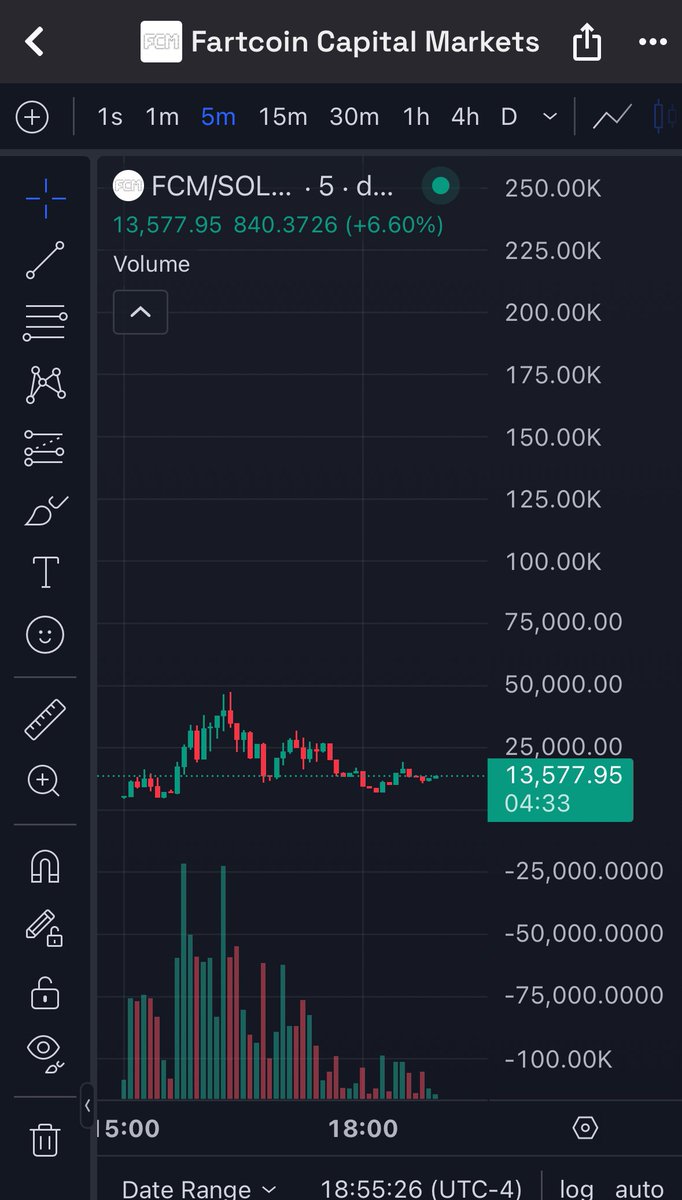
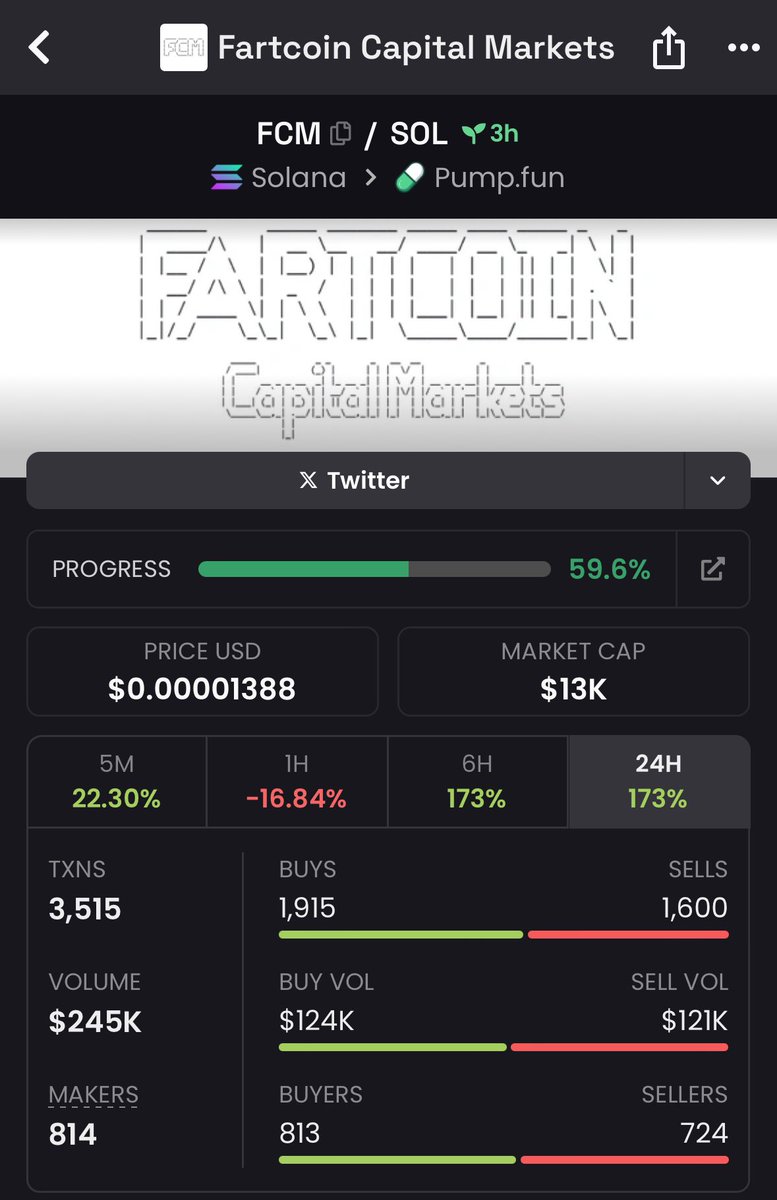

Meme Detective
Fartcoin Capital Markets $FCM
We can now swap between #fartcoin and USA stocks. This is much bigger than $ICM and $TCM
7oiH49RpiBGVyDMFPWL8yNH7wKTNn9mVrRMpoA8wpump
#memestock $alon $etf $obay $hulked #mortgage #nvidia $ppp $ufd
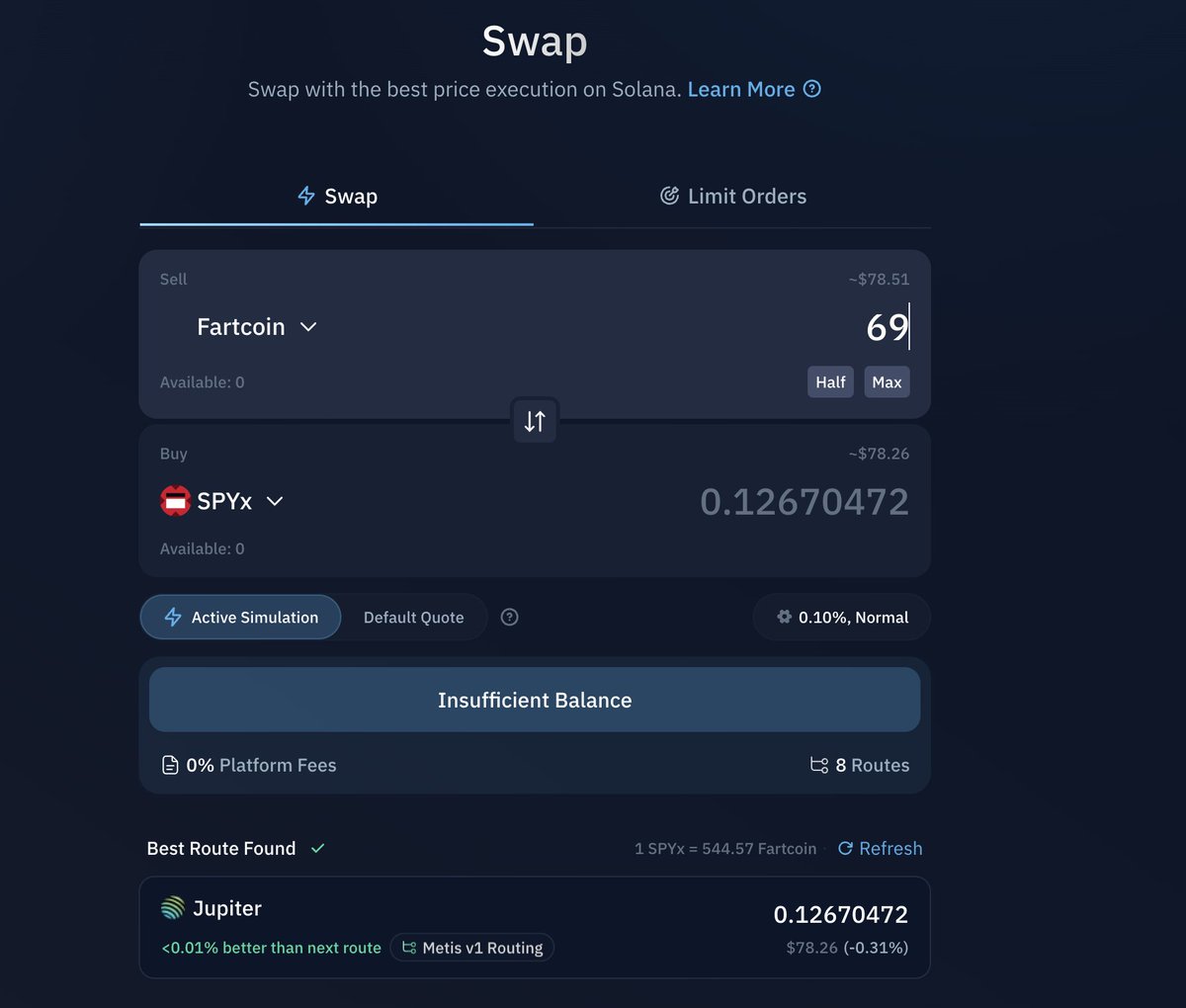
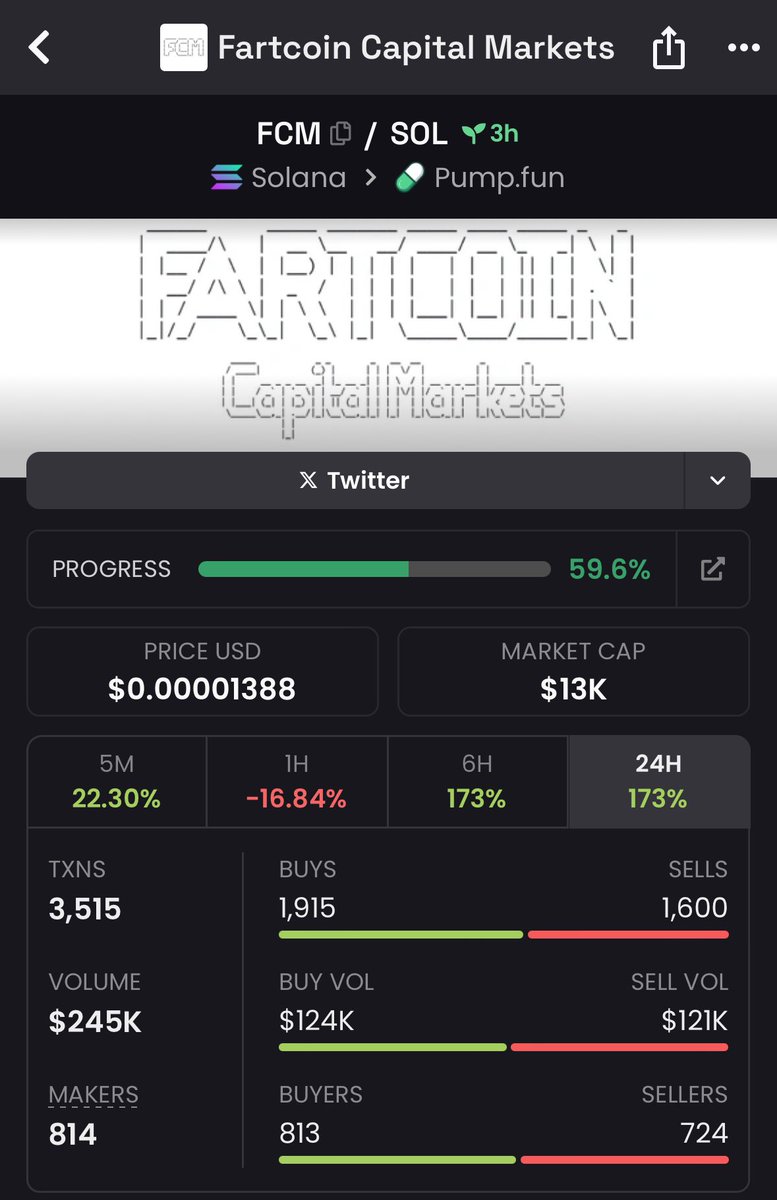
8.76K
8
etf price performance in USD
The current price of sol-etf-coin is $0.00013748. Over the last 24 hours, sol-etf-coin has increased by +261.09%. It currently has a circulating supply of 999,999,960 etf and a maximum supply of 999,999,960 etf, giving it a fully diluted market cap of $137.48K. The sol-etf-coin/USD price is updated in real-time.
5m
+27.35%
1h
+261.09%
4h
+261.09%
24h
+261.09%
About sol etf coin (etf)
etf FAQ
What’s the current price of sol etf coin?
The current price of 1 etf is $0.00013748, experiencing a +261.09% change in the past 24 hours.
Can I buy etf on OKX?
No, currently etf is unavailable on OKX. To stay updated on when etf becomes available, sign up for notifications or follow us on social media. We’ll announce new cryptocurrency additions as soon as they’re listed.
Why does the price of etf fluctuate?
The price of etf fluctuates due to the global supply and demand dynamics typical of cryptocurrencies. Its short-term volatility can be attributed to significant shifts in these market forces.
How much is 1 sol etf coin worth today?
Currently, one sol etf coin is worth $0.00013748. For answers and insight into sol etf coin's price action, you're in the right place. Explore the latest sol etf coin charts and trade responsibly with OKX.
What is cryptocurrency?
Cryptocurrencies, such as sol etf coin, are digital assets that operate on a public ledger called blockchains. Learn more about coins and tokens offered on OKX and their different attributes, which includes live prices and real-time charts.
When was cryptocurrency invented?
Thanks to the 2008 financial crisis, interest in decentralized finance boomed. Bitcoin offered a novel solution by being a secure digital asset on a decentralized network. Since then, many other tokens such as sol etf coin have been created as well.
Monitor crypto prices on an exchange
Watch this video to learn about what happens when you move your money to a crypto exchange.
Disclaimer
The social content on this page ("Content"), including but not limited to tweets and statistics provided by LunarCrush, is sourced from third parties and provided "as is" for informational purposes only. OKX does not guarantee the quality or accuracy of the Content, and the Content does not represent the views of OKX. It is not intended to provide (i) investment advice or recommendation; (ii) an offer or solicitation to buy, sell or hold digital assets; or (iii) financial, accounting, legal or tax advice. Digital assets, including stablecoins and NFTs, involve a high degree of risk, can fluctuate greatly. The price and performance of the digital assets are not guaranteed and may change without notice.
OKX does not provide investment or asset recommendations. You should carefully consider whether trading or holding digital assets is suitable for you in light of your financial condition. Please consult your legal/tax/investment professional for questions about your specific circumstances. For further details, please refer to our Terms of Use and Risk Warning. By using the third-party website ("TPW"), you accept that any use of the TPW will be subject to and governed by the terms of the TPW. Unless expressly stated in writing, OKX and its affiliates (“OKX”) are not in any way associated with the owner or operator of the TPW. You agree that OKX is not responsible or liable for any loss, damage and any other consequences arising from your use of the TPW. Please be aware that using a TPW may result in a loss or diminution of your assets. Product may not be available in all jurisdictions.
OKX does not provide investment or asset recommendations. You should carefully consider whether trading or holding digital assets is suitable for you in light of your financial condition. Please consult your legal/tax/investment professional for questions about your specific circumstances. For further details, please refer to our Terms of Use and Risk Warning. By using the third-party website ("TPW"), you accept that any use of the TPW will be subject to and governed by the terms of the TPW. Unless expressly stated in writing, OKX and its affiliates (“OKX”) are not in any way associated with the owner or operator of the TPW. You agree that OKX is not responsible or liable for any loss, damage and any other consequences arising from your use of the TPW. Please be aware that using a TPW may result in a loss or diminution of your assets. Product may not be available in all jurisdictions.


